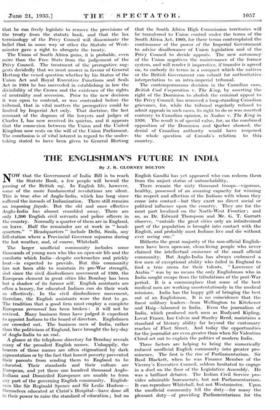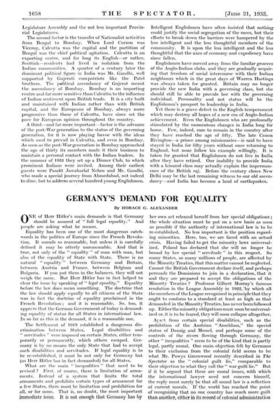THE ENGLISHMAN'S FUTURE IN INDIA
By J. R. GLORNEY BOLTON
NOW that the Government of India Bill is to reach the Statute Book, a few people will bewail the passing of the British raj. In English life, however, some of the more fundamental revolutions are silent. This is true also of Anglo-India, which has long since suffered the inroads of Indianization. There still remains an imposing facade. But the old and once effective Anglo-India has almost crumbled away. There are only 1,300 English civil servants and police officers in the country. Normally a quarter of them are in England, on leave. Half the remainder are at work in " head- quarters." " Headquarters " include Delhi, Simla, any hill-station where a Provincial Governor sojourns during the hot weather, and, of course, Whitehall.
The larger unofficial community includes some thousands of young men who like an open-air life and the comforts which India—despite cockroaches and prickly heat—is expected to provide. But this community has not been able to maintain its pre-War strength, and since the civil disobedience movement of 1930, the European element in great cities like Bombay has been but a shadow of its former self. English assistants are often a luxury, for educated Indians can do their work as effectively. In the civil disobedience movement, therefore, the English assistants were the first to go. The tradition that a good firm must employ a complete. European personnel has been broken : it will not be revived. Many business firms have judged it expedient to appoint Indians to the board of directors. Englishmen are crowded out. The business men of India, rather than the politicians of England, have brought the hey-day of Anglo-India to an end.
A glance at the telephone directory for Bombay reveals many of the proudest English names. Unhappily, the bearers of those names are often stigmatized by dark pigmentation or by the fact that honest poverty prevented their parents from sending them to England to be educated. Their standards and their culture are European, and yet these one hundred thousand Anglo- Indians and Domiciled Europeans are unable to form any part of the governing English community. English- men like Sir Reginald Spence and 'gir Leslie Hudson- themielves educated at Christ's Hospital—have done all in their power to raise the standard of educa:tion ; but no English Gandhi has yet appeared who can redeem them from the unjust status of untouchability.
There remain the sixty thousand troops—vigorous, healthy, possessed of an amazing capacity for winning the respect and affection of the Indians with whom they come into contact—but they exert no direct social or political influence upon the country. They are for the most part localized on the North-West Frontier ; and so, as Dr. Edward Thompson and Mr. G. T: Garrett observe, "outside the great cities only an infinitesimal part of the population is brought into contact with the English, and probably most Indians live and die without ever seeing one."
Hitherto the great majority of the non-official English- men have been open-air, clean-living people who never claimed the intellectual eminence of the small official community. But Anglo-India has always embraced a few men of exceptional ability who failed in England to find a true arena for their talents. " Lawrence of Arabia " was by no means the only Englishman who in India sought escape from the tribulations of the post-War period. It is a commonplace that some of the best medical men are working unostentatiously in the medical missions. India has the happy gift of bringing the best out of an Englishman. It is no coincidence that the finest military leaders—from Wellington to Kitchener and Haig—laboured in India. Even the journalism of India, which produced such men as Rudyard Kipling,• Lovat Fraser, Ian Colvin and Stanley Reed, maintains a standard of literary ability far beyond the customary reaches of Fleet Street. And today the opportunities for the journalist are even greater than when Sir Valentine Chirol set out to explain the politics of modern India.
Three factors are helping to bring the numerically reduced unofficial English community into greater pro- minence. The first is the rise of Parliamentarism. Sir Basil Blackett, when he was Finance Member of the Viceroy's Executive Council, seldom hesitated to engage in a duel on the floor of the Legislative Assembly. He was a brilliant debater. The Indian Civil Service pro- vides admirable bureaucrats, but not Parliamentarians. It can reproduce Whitehall, but not Westminster. Upon the unofficial community fell the duty—for many the pleasant duty—of providing Parliamentarians for the Legislature Assembly and the not less important Provin cial Legislatures.
The second factor is the transfer of Nationalist activities from Bengal to Bombay. When Lord Curzon was Viceroy, Calcutta was the capital and the partition of Bengal was the chief political agitation. Calcutta is an exporting centre, and for long its English—or rather, Scottish—residents had lived in isolation from the Indian communities. A quarter of a century later the dominant political figure in India was Mr. Gandhi, well supported by Gujerati compatriots like the Patel brothers. The political ascendancy of Gujerat meant the ascendancy of Bombay. Bombay is an importing centre and far more sensitive than Calcutta to the influence of Indian sentiment upon British trade. It is a city built and maintained with Indian rather than with British capital, and the Europeans of Bombay, always more progressive than those of Calcutta, have since set the pace for European opinion throughout the country.
A third—and far more important—factor is the advance of the post-War generation to the status of the governing generation, for it is now playing havoc with the ideas which used to prevail in Calcutta, and even in Bombay. As soon as the post-War generation in Bombay approached the age of thirty its members made it their business to maintain a personal contact with the Indian leaders. In the summer of 1931 they set up a Dinner Club; to which prominent Indians were invited. Among their earliest guests were Pandit Jawaharlal Nehru and Mr. Gandhi, who made a special journey from Ahmedabad, not indeed to dine, but to address several hundred young Englishmen. Intelligent Englishmen have often insisted that nothing could justify the social segregation of the races, but their efforts to break down the barriers were hampered by the less intelligent and the less thoughtful members of the community. It is upon the less intelligent and the less thoughtful that the axes of economy and expediency have since fallen.
Englishmen have moved away from the familar grooves of the Anglo-Indian clubs, and they are gradually acquir- ing that freedom of social intercourse with their Indian neighbours which in the great days of Warren Hastings was always taken for granted. Britain may no longer provide the new India with a governing class, but she should still be able to provide her with the governing individual. Personality and not status will be the Englishman's passport to leadership in India.
Yet there is a grave defect in the English temperament which may destroy all hopes of a new era of Anglo-Indian achievement. Even the Englishmen who are profoundly stimulated by the momentous changes in India long for home. Few, indeed, care to remain in the country after they have reached the age of fifty. The late Canon Rivington—a prince among missionaries—is said to have stayed in India for fifty years without once returning to England, but none follow his example willingly. It is taken for granted that Englishmen do not live in India after they have retired. Our inability to provide India with a leisured class may actually explain the imperman- ence of the British raj. Before the century closes New Delhi may be the last remaining witness to our old ascen- dancy—and India has become a land of earthquakes.









































 Previous page
Previous page